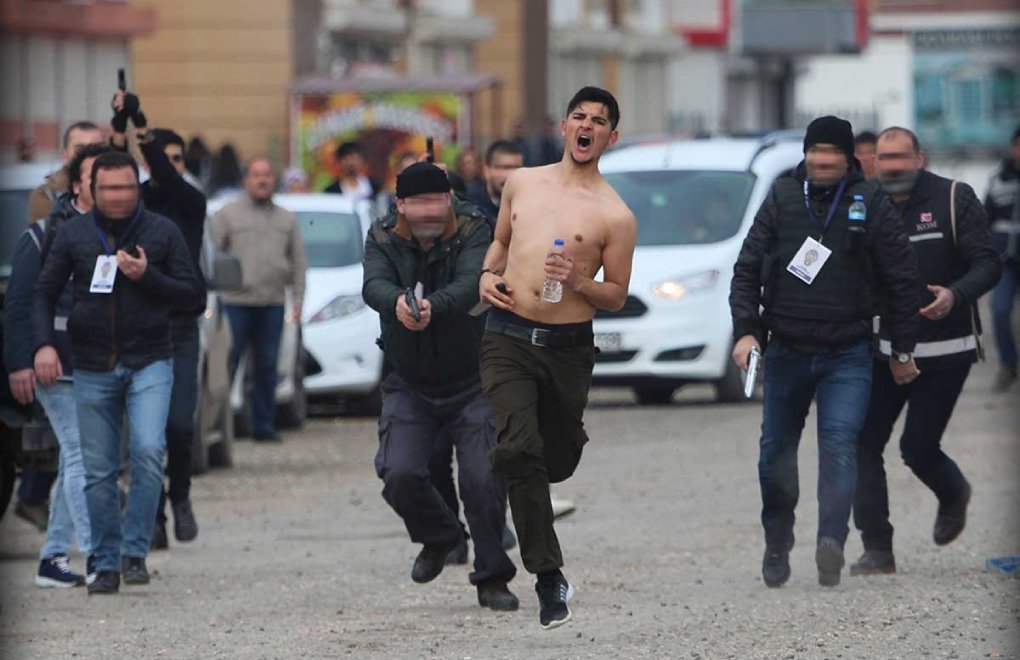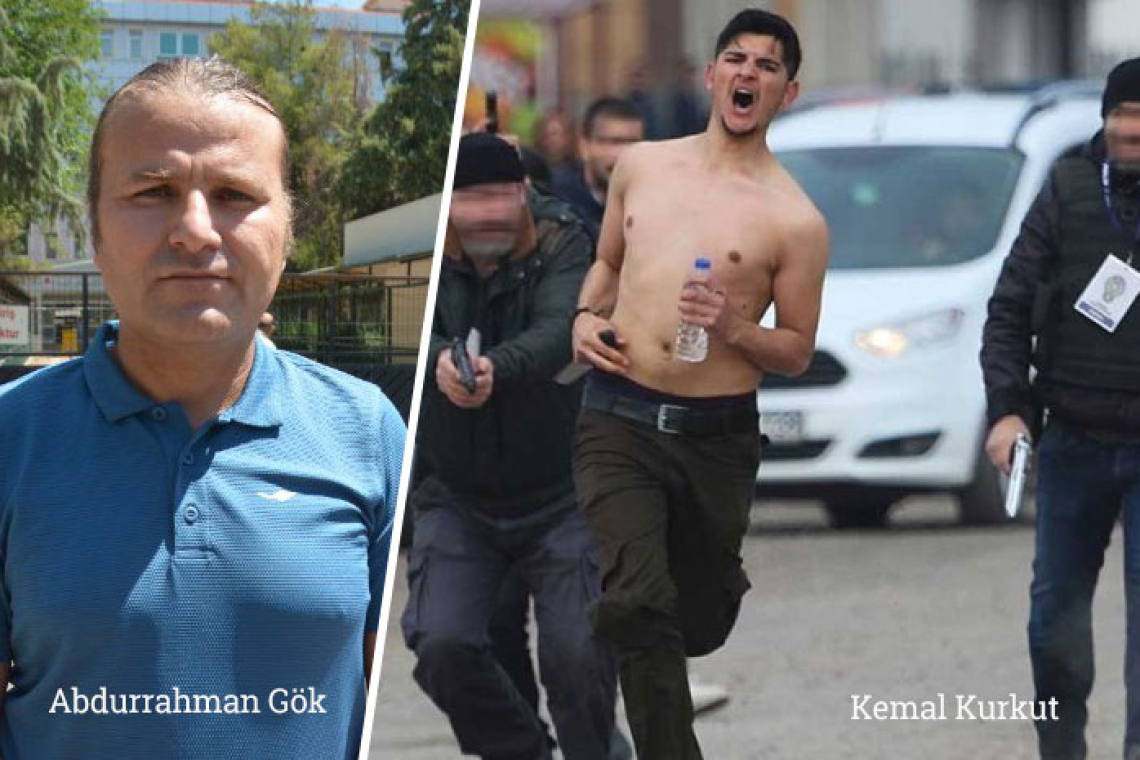DENİZ TEKİN
"After I shared the Kemal Kurkut photos, I faced continuous pressure."
Abdurrahman Gök, editor of Mezopotamya Agency (MA), explains his arrest on allegations of "membership in an illegal organization."
Gök, who was detained on April 25 in a Diyarbakır-based operation, has been held in Diyarbakır High-Security Prison No. 1 for 133 days.
On September 14, he is scheduled to make his inaugural appearance before the Diyarbakır 5th High Criminal Court as part of this investigation. Potentially facing a sentence of 22.5 years in prison.
However, this is not the first investigation against Gök. Ever since he photographed 22-year-old Kemal Kurkut, whom a police bullet killed during a Newroz celebration in Diyarbakır in 2017, Gök has faced numerous investigations and charges.
He has been subjected to three separate investigations, with police raids on his residence conducted three times. Additionally, he was sentenced to 1 year and 6 months in prison in a case filed for his journalistic activities.
Kurkut, a 23-year-old university student, was shot dead by the police as he entered the Newroz celebration area. The Diyarbakır Governor's Office said on the same day that Kurkut was "suspected of being a suicide attacker", although this assertion has remained unverified over the six intervening years.
Yakup Şenocak, a police officer who was charged with "murder with probable intent" and was facing life imprisonment, was allowed to stand trial without detention. After a three-month suspension, he was subsequently reinstated.
The series of photographs taken by Gök at the time are pivotal evidence in the Kurkut murder case.
Abdurrahman Gök, who is waiting to appear before the judge, answered our questions:
-
The accusations in your indictment are related to your journalistic activities, although you are not explicitly labeled as a journalist. What would you like to say about this?
This indictment actually serves to confirm my position as a journalist. It's a comprehensive 14-page document that contradicts itself to such an extent that my response seems almost unnecessary. As far as I understand, they arrested me for allegedly being an employee of Pel Production. However, the case file contains documents showing that I have been a Mesopotamia Agency reporter since the agency was founded. There's an accusation suggesting I've been producing and sending programs to Kurdish television channels in Europe. But all of my news included in the file is news published by Mezopotamya Agency. These allegations are self-discrediting. I wonder how the court will approach these allegations.

-
During your prior defense in court, you said, "It is my journalism that is on trial here. The purpose of this case is to take revenge on me for Kurkut's murder." Do you believe that this current case, where you are under trial in detention, stems from the same motives?
I am in the same position as before. After I shared the Kemal Kurkut photos, I faced continuous pressure. They even presented a secret witness who claimed that Kemal Kurkut was a member of a terrorist organization and that I took the photos on their instructions. Instead of condemning this recklessness, the court sentenced me. However, this wasn't enough punishment for exposing the official lies in those photos. Once again, I find myself on trial in the same court, but this time in pre-trial detention. Yet again a witness was fabricated, this time called an 'open witness'. However, in his testimony, which was taken four times because of his lack of knowledge about me, he said a few things about me, seemingly under pressure from the prosecutor. Even a primary school student could see the contradictions in his words, but the prosecutor and the court that accepted the indictment didn't seem concerned about these inconsistencies. It leaves only one plausible motive: the publication of the Kemal Kurkut photographs.
-
The prosecutor initially found Ü.A.'s statement, which led to your arrest, insufficient. However, shortly after receiving an additional statement from him, an indictment against you was quickly prepared. A similar situation occurred in your previous trial, resulting in the preparation of an additional indictment after a court filed a criminal complaint. How do you view these practices within the judiciary?
In reality, Ümit Akbıyık had not made any statement against me. When I told this to the prosecutor during my detention, they also saw that he had not made any statement against me, even though they put his photograph in my file. However, later in May, new statements were taken from Ümit Akbıyık twice. Again, there was no statement about me. In June, when the new prosecutor was about to present the indictment to the court, two more statements were taken from this person. Evidently, when he once again failed to provide any information about me, the prosecutor explicitly mentioned my name and requested his testimony regarding me. This is evident from Ümit Akbıyık's statement on June 12, which begins with the sentence: "You asked about Abdurrahman GÖK..." After a few sentences of false statements, the prosecutor must have achieved his goal because he completed his indictment just one day later, on June 13. Doesn't all of this show that the judiciary and the police are particularly interested in me?
-
The same court that accepted the indictment and handled your case in Diyarbakır, during your previous trial on the same charges, viewed your defense of your journalistic identity and professional responsibilities as an "attempt to avoid punishment." However, they didn't suspend your sentence because they believed there was no assurance you wouldn't re-offend. Are you concerned about facing trial in the same court once more?
Yes, I will be tried in the same court again. The Diyarbakır 5th High Criminal Court used a printed expression such as 'to avoid punishment' for my defense, even though I defended my journalism and all my news reports and photographs that were accused of 'crime'. Look, there is the same phrase in this new indictment. In other words, you get the feeling that you have been sentenced even before you are taken into custody. Everything else is just a formality. It doesn't matter what we report on if the police and the judiciary have decided for you... In my previous trial, news photographs from Kobanê, Şengal, and Raqqa, where I was a war correspondent, were used as grounds for punishment. Now, the news that I have been promoting books published by publishing houses, released from the printing house with the approval of the press prosecutor, and banderole by the Ministry of Culture are being put in the file as 'criminal elements'. Imagine, it has come to such a point that the prosecutor has even put the promotion of Elisee Reclus' The Story of a Mountain and four other books in the indictment. Why do you think the prosecutor put this news in the file? I leave that to the readers. I wonder if we should ask the court to hear this author. I mean, this is how deplorable the situation is.
-
You informed the MLSA lawyers that you are facing difficulties accessing newspapers, books, and magazines in prison. Your mail is being confiscated, and the names you want to add to the visitors' list are being rejected. Are these practices unique to your situation? How do you stay informed about what's happening outside?
The arbitrary behavior that pervades all institutions in the country is even more pronounced and widespread in prison. On the outside, there are ways to expose such situations and shape public opinion. But in prison, it's not as straightforward. Laws and rules can be set aside with excuses like "institutional security" and "staff shortages." The issue of letters not being sent or being censored is not exclusive to me. When I was outside, we received many similar complaints. Now, I'm experiencing this firsthand. A friend I designated as a visitor was rejected without any explanation, and this happened quickly. Some prisoners here have been waiting for a response to their applications for a year, and there's no mechanism to address this arbitrary situation. In reality, isolation is applied to all prisoners who are detained for their beliefs.
Our only source of news from the outside world is limited to TV channels and newspapers approved by the government, which often follow their editorial guidelines. If you can call it being informed. There's also arbitrariness in terms of publications. For instance, the Constitutional Court ruled that denying prisoners access to the Yeni Yaşam newspaper is a rights violation. However, the prison prosecutor or administration might simply ignore this decision and refuse to provide the newspaper. The same goes for Evrensel and Birgün newspapers. Even when requesting channels like Halk TV, Tele 1, or KRT TV, the response is usually "no." Despite all these restrictions and isolation, I attempt to stay informed through my family, even if it's just once a week.
-
In the past year, there has been an increase in detentions and arrests of journalists in the Kurdish media. Why do you believe there is this growing pressure and focus on such actions?
This government is targeting anyone who advocates for the freedom, language, culture, and survival of their people. They believe they can reach their objectives by forcing thousands, even tens of thousands, into exile and arresting as many as possible. They view the Kurdish press, which represents independent journalism, as a significant barrier to their plans. Without the press, events like the ecological damage in Cudi, incidents involving individuals like Kemal Kurkut and Uğur Kaymaz, the helicopter incident in Van, İpek Er's case, and many other violations would go unnoticed. The government's strategy is to silence the free press, thinking it will make their goals easier to achieve by arresting journalists like me. However, this effort is in vain.
-
Why is it crucial to stand by journalists facing repression and imprisonment?
Solidarity and support are indeed crucial, but for me, they don't determine my journalism personally. As Tolstoy once said, "If you feel your pain, you are alive; if you feel someone else's pain, you are human." Those who aspire to be truly human also carry the pain of others in their hearts.
-
Do you have any messages for the press, professional organizations, and your colleagues ahead of your trial?
See you in the courtroom of the Diyarbakır 5th High Criminal Court on September 14th.
What Happened?
Journalists Abdurrahman Gök, Mehmet Şah Oruç, Mikail Barut, and Beritan Canözer were arrested during house raids on April 25 as part of an investigation based in Diyarbakır. Meanwhile, journalists Ahmet Kanbal, Murat Bayram, Hakkı Boltan, and Ferhat Çelik, who were detained later, were released with judicial control measures. Journalist Beritan Canözer was released on June 23.
The Diyarbakır Chief Public Prosecutor's Office has compiled an indictment against the arrested journalist Gök. He faces charges of "being a member of an illegal organization" and "propagating for an illegal organization."
The indictment points to various pieces of evidence, including Gök's news articles and book promotions published in the Mezopotamya Agency, books found in his library, records indicating that his insurance was paid by MA, phone conversations with fellow journalists, social media posts featuring news content and book promotions.
One of the incriminating pieces of evidence mentioned in the indictment is a letter penned by Abdurrahman Gök to Abdulhamit Gül, who was then the Minister of Justice, requesting the release of a prisoner. Additionally, one of the books deemed suspicious was journalist Kadri Gürsel's Those on the Mountain 26 Days from Bagok to Gabar.
The prosecutor alleges that Gök was actively involved in the organization's media activities and that he contributed to the organization through the publications and content he produced. Furthermore, the prosecutor argues that Gök's defense is merely an attempt to evade the charges and should not be given any credence.



